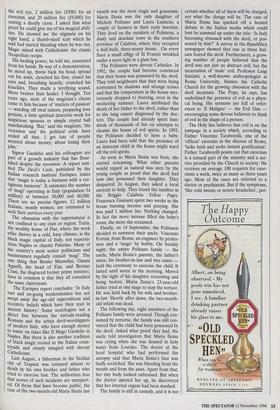ITALY'S OBSESSION WITH THE DEVIL
Matt Frei reports from the front-line
in a nation where modernisation has done nothing to eradicate superstition
Rome A FRIEND of mine had told me that if I really wanted to get hold of a magician or an exorcist I should look in the 'Magi' sec- tion of the Yellow Pages. The choice of paranormal offered in the commercial tele- phone directories of Italy's big cities was ample. The Rome directory alone has five pages. Example: `Tiziana' — Specialist in Curses — will defeat your rivals in business and in love FOR EVER. Ring 06 653 5060 or (for emergencies) cellphone 0336 74 40 82.
The one that caught my attention was Professor Mago Gardelio: 'Expert in com- munication with the dead, hypnotist, exor- cist and pranotherapist. LEGAL ADVICE INCLUDED. 081 345 666.' It listed a Naples number and, since I happened to be there, I decided to pay Mr Gardelio a visit.
His 'surgery' was located behind the cen- tral bus station on the second floor of a seedy block of flats. An assistant in her twenties opened the door. I should have made an appointment. The waiting-room was packed with visitors, most of them women, many of them with children in tow. Two policemen were sitting in the corner, nervously playing with their caps. The walls were decorated with the `mago's' trophies. A framed newspaper article explained how he had liberated a 30-year-old carabiniere officer from the devil. Next to it hung an elegant certificate, according to which Mr Gardelio had taken part in a 'European Community workshop for small-scale entrepreneurs'.
`Signor Frei, you will be seen now,' the secretary called into the room. I felt faintly embarrassed. Gardelio's surgery was bathed in red light, thanks to a red lamp- shade and red plastic sheeting taped over the window. I felt a mixture of bemuse- ment and awe as I was led inside. The eclectic magician who could drive out demons, cast evil spells and give legal advice stood behind his desk. A small, port- ly man with long black hair tied in a pony- tail, he wore a yellow silk blouse and black trousers with razor-sharp pleats. A large glistening medallion was embedded in his hairy chest. Miniature skulls and items of clothing were assembled on one table. The other displayed a collection of half-melted candles in human shapes. Behind a glass vitrine on the shelves I could see a twisted piece of silver foil that looked disturbingly like a human shape. 'What is that for?' I asked.
There was a slight pause. The Imago' looked irritated. 'That,' he said in a quiet, almost inaudible voice, 'was the wrapper of my lunch sandwich.' The spell was momen- tarily broken. The `mago' continued with the session. I had, after all, paid my 100,000 lire (£45) an hour for basic consul- tation.
I asked about the price-list. The fees ranged from 800,000 lire (£320) to ward off the evil eye, 2 million lire (£900) for an exorcism, and 20 million lire (£9,000) for casting a deadly curse. I asked him what proof he could give me of his magical abili- ties. He showed me the stigmata on his right hand, a thumb-sized scab which he said had started bleeding when he was ten. Magic mixed with Catholicism: the classic Neapolitan recipe. His healing power, he told me, emanated from his hands. By way of a demonstration, he stood up, threw back his head, spread out his arms, clenched his fists, closed his eyes and, breathing heavily, crunched his knuckles. They made a terrifying sound. More bruiser than healer, I thought. Ten years ago, most of the magician's clients came to him because of 'matters of passion' — warding off rival suitors, preparing love potions, a little spiritual detective work for suspicious spouses or simple crystal ball matchmaking. 'But,' said the magician, 'the recession and the political crisis have ended all that. I get lots of people worried about money, about losing their jobs.'
Signor Gardelio and his colleagues are part of a growth industry that has flour- ished despite the recession. A report enti- tled The Devil's Cash, published by the Italian research institute Eurispes, states that 'magic is today a business with a ver- tiginous turnover'. It estimates the number of 'magi' operating in Italy (population 54 million) at between 30,000 and 60,000. There are no precise figures. 12 million Italians, mostly women, are estimated to seek their services every year. The obsession with the supernatural is not confined to any class or region. Turin, the wealthy home of Fiat, where the work ethic thrives in a cold, hazy climate, is the black magic capital of Italy, not supersti- tious Naples or chaotic Palermo. Many of the country's most senior politicians and businessmen regularly consult `magi'. The One thing that Benito Mussolini, Gianni Agnelli, the head of Fiat, and Bettina Craxi, the disgraced former prime minister, have in common is that they all consulted the same clairvoyant. The Eurispes report concludes: 'In Italy vast and on-going modernisation has not swept away the age-old superstitions and eccentric beliefs which have their root in ancient history.' Some sociologists see a direct line between the entrails-reading Romans and the urban devil-worshippers of modern Italy, who have enough money to waste on fakes like II Mago Gardelio in Naples. But there is also another tradition of black magic rooted in the Italian coun- tryside and closely mingled with devout Catholicism.
Last August, a fisherman in the Sicilian city of Trapani was tortured almost to death by his own brother and father who tried to exorcise him. The authorities fear that scores of such incidents are unreport- ed. Of those that have become public, the case of the two-month-old Maria Ilenia last month was the most tragic and gruesome. Maria Ilenia was the only daughter of Michele Politano and Laura Lumicisi, a couple of farmers in their early twenties. They lived on the outskirts of Polistena, a dusty and desolate town in the southern province of Calabria, where they occupied a half-built, three-storey house. On every floor a small effigy of St Francis twinkled under a neon light in a glass box.
The Politanos were devout Catholics. In 1992, the couple had become convinced that their house was possessed by the devil. They told neighbours that they were being tormented by shadows and strange noises and that the temperature in the house mys- teriously dropped to freezing, even in the sweltering summer. Laura attributed the death of her father to the devil, rather than to the lung cancer diagnosed by the doc- tors. The couple had already spent hun- dreds of thousands of lire on attempts to cleanse the house of evil spirits. In 1993, the Politanos decided to have a baby. Laura had been told that the presence of an innocent child in the house might ward off the evil spirits.
As soon as Maria Ilenia was born, she started screaming. What other parents would regard as natural was seen by the young couple as proof that the devil had now also possessed their daughter. They despaired. In August, they asked a local exorcist to help. They found the number in the Reggio Calabria Yellow Pages. Francesca Giananti spent two weeks in the house burning incense and praying. She was paid 1 million lire. Nothing changed. In fact the more incense filled the baby's room, the more she screamed.
Finally, on 14 September, the Politanos decided to summon their uncle, Vincenzo Fortini, from Rome, an engineer by profes- sion and a 'mago' by hobby. On Sunday night, the entire Politano family — the uncle, Maria Ilenia's parents, the father's sister, his brother-in-law and two aunts held the ceremony to exorcise the child. It lasted until seven in the morning. Moved by the sight of his daughter screaming and being beaten, Maria Ilenia's 23-year-old father tried at one stage to stop the torture. He was held back by his wife and brother- in-law. Shortly after dawn, the two-month- old infant was dead.
The following day, eight members of the Politano family were arrested. Though con- sumed by remorse, the family was still con- vinced that the child had been possessed by the devil. Asked what proof they had, the uncle told investigators that Maria Ilenia was crying when she was doused in holy water from Lourdes. The doctor at the local hospital who had performed the autopsy said that Maria Ilenia's face was badly scratched. She was bleeding from the mouth and from the anus. Apart from that, her tiny body looked unbruised. But when the doctor opened her up, he discovered that her internal organs had been mashed.
The family is still in custody, and it is not certain whether all of them will be charged, nor what the charge will be. The case of Maria Ilenia has sparked off a heated debate in the Italian media which could best be summed up under the title: 'Is Italy becoming obsessed with the devil, or pos- sessed by him?' A survey in the Repubblica newspaper showed that one in three Ital- ians feared the devil. Furthermore, a grow- ing number of people believed that the devil was not just an abstract evil, but the incarnation of 'male' evil. Professor Luigi Satriani, a well-known anthropologist at Rome University, blames the Catholic Church for the growing obsession with the devil incarnate. The Pope, he says, has underlined the presence of evil as a physi- cal being. His sermons are full of refer- ences to 'II Malign' — the Evil One encouraging some devout believers to think of evil in the shape of a person.
The Holy See believes that evil is on the rampage in a society which, according to Father Vincenzo Taraborelli, one of the `official' exorcists in the diocese of Rome, `lacks faith and seeks instant gratification'. Father Taraborelli points out that exorcism is a natural part of the ministry and a ser- vice provided by the Church to society. He receives on average 100 requests for exor- cisms a week, twice as many as three years ago. Most of the cases are referred to a doctor or psychiatrist. But if the symptoms, `like cold sweats or severe headaches', per- sist, then he will consider exorcism. What most angered him about the tragic exor- cism of Maria Ilenia is that it was left to amateurs.




































































 Previous page
Previous page